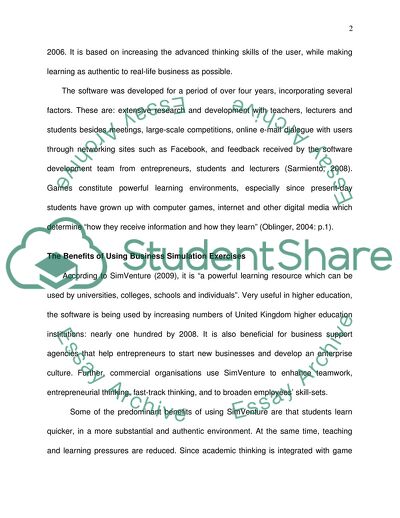
- Home
- Free Samples
- Premium Essays
- Editing Services
- Extra Tools
- Essay Writing Help
- About Us
- Studentshare
- Subjects
- Miscellaneous
- B Plan & Develop2
B Plan & Develop2 - Essay Example

- Subject: Miscellaneous
- Type: Essay
- Level: Undergraduate
- Pages: 4 (1000 words)
- Downloads: 0
- Author: creinger
Extract of sample "B Plan & Develop2"
Thesis Statement: The purpose of this paper is to investigate the benefits of using business simulation exercises; discuss one’s experience of using SimVenture and comment on how a real business is different from business simulation games. The United Kingdom, similar to other countries, requires more businesses to start and survive, particularly in the current global economic down-turn. Additionally, better growth and sustainability rates of new businesses have to be ensured. “However, mainstream teaching and training resources for potential entrepreneurs have changed little in the past 20 years” (Sarmiento, 2008: p.1). For this purpose, the business development simulation software SimVenture, created in the form of games, was launched in October 2006.
It is based on increasing the advanced thinking skills of the user, while making learning as authentic to real-life business as possible. The software was developed for a period of over four years, incorporating several factors. These are: extensive research and development with teachers, lecturers and students besides meetings, large-scale competitions, online e-mail dialogue with users through networking sites such as Facebook, and feedback received by the software development team from entrepreneurs, students and lecturers (Sarmiento, 2008).
Games constitute powerful learning environments, especially since present-day students have grown up with computer games, internet and other digital media which determine “how they receive information and how they learn” (Oblinger, 2004: p.1). According to SimVenture (2009), it is “a powerful learning resource which can be used by universities, colleges, schools and individuals”. Very useful in higher education, the software is being used by increasing numbers of United Kingdom higher education institutions: nearly one hundred by 2008.
It is also beneficial for business support agencies that help entrepreneurs to start new businesses and develop
...Download file to see next pages Read MoreCHECK THESE SAMPLES OF B Plan & Develop2
Plan to Develop a Global Virtual Team
Develop a three year professional action plan
How to Develop a Plan That Really Works
Develop a Communications Plan
Develop a marketing plan
How to Develop a Business Plan
Marketing and Promotion: Develop a Marketing Plan
A Process Develop a Business Continuity Plan

- TERMS & CONDITIONS
- PRIVACY POLICY
- COOKIES POLICY